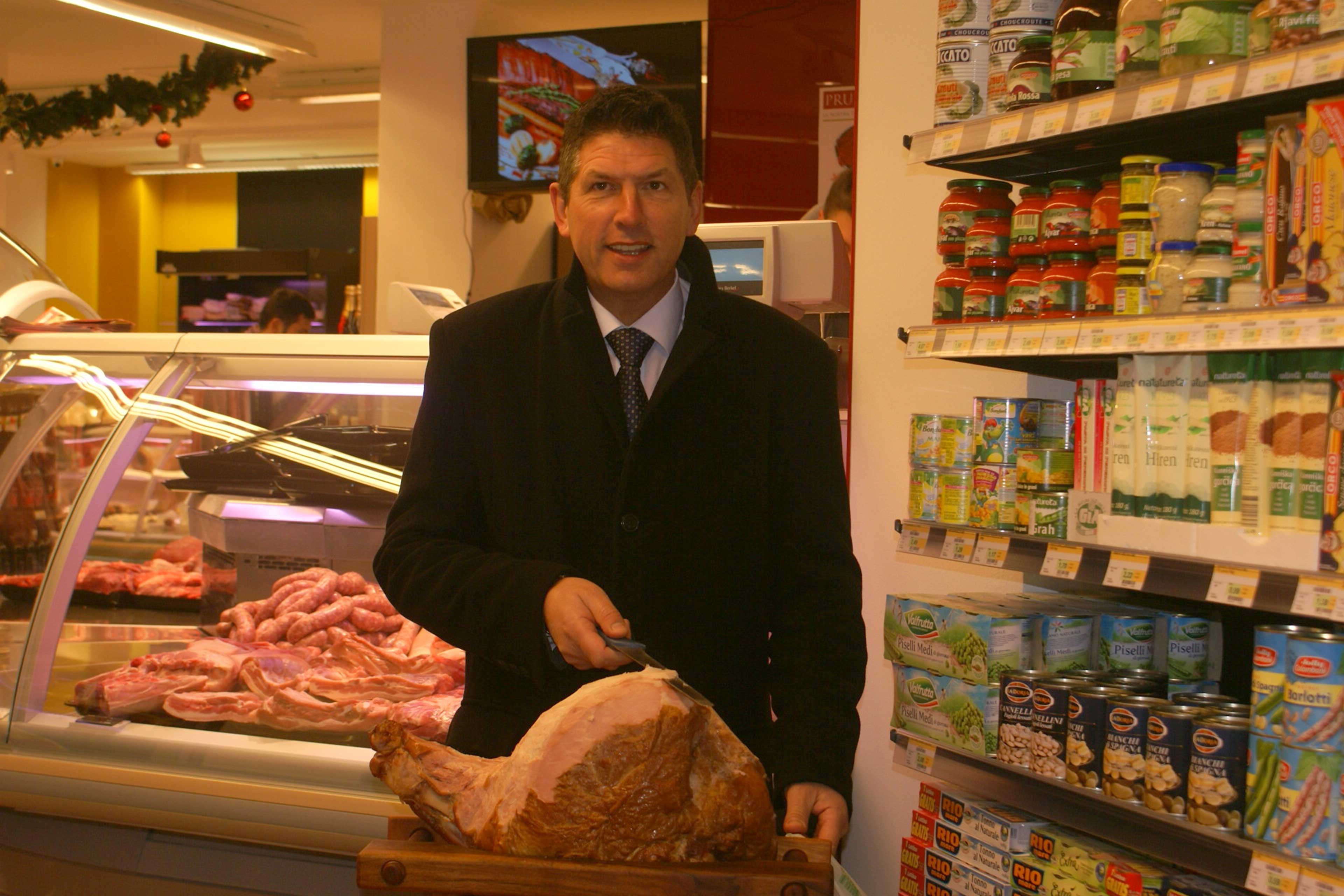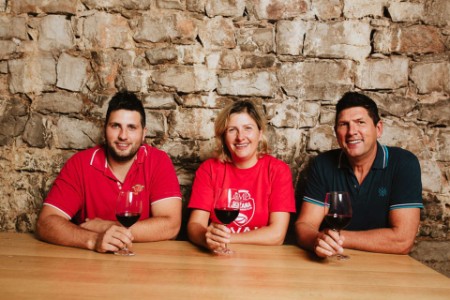Before the war, their enterprising grandfather sold meat to the Italians
The beginnings of the family business date back to 1928, when Avgust Prunk, grandfather of today’s director Marko Prunk, opened his butcher’s business. “At that time Postojna was part of Italy. He used to slaughter young heifers at home and transport meat to Trieste.” The family business continued during the war period, when Marko’s father worked as a butcher’s trainee in Senožeče. After the war, he was employed in a cooperative society in Sežana, which has since evolved into the well-known meat-producing company, Kras. He persisted there until 1967 when he decided to make a bold move and opened a small butcher’s and a slaughterhouse in his native village. “Only two years after it was opened, the butcher’s had to be closed as he fell ill. In 1972, I began to learn the butcher’s trade working at the butcher’s owned by my dad’s friend. My father did not show much enthusiasm for my career decision, because he knew what a difficult profession this was. I worked in the local butcher’s until 1989, when I decided to buy it. And thus, on 13 November 1990, I began my entrepreneurial journey,” says Marko, sharing his story.

The family business employs 140 people
Although the shop proved lucrative, Marko soon realized that the business was far too dependent on the Italian market and in 1994 he decided that it needed to expand. So, he bought a shop in the centre of Sežana that remains popular to this day and leased three butcher’s shops that were under the aegis of Kras Sežana. “It was at that time that I employed the first 10 members of staff. I owned a central shop and leased three butcher’s shops. While I managed all of them, the accounting was always done by my mother. She helped in the family business until her death at the age of 82,” explains Marko. Today, he runs Mesarija Prunk s.p., which includes butcher’s shops in Divača and Lokev, a restaurant in Lokev, as well as the production, processing and drying plant and business premises in Sežana. In 2009 he took over a slaughterhouse in Postojna and today the company Postojnske mesnine d.o.o. already has seven retail stores in Postojna, Ajdovščina, Deskle, Dornberk, Izola and Piran (three of these used to be part of MIP). In addition, Marko bought Market Prunk in Kozarno in Goriška brda and took over two markets that used to operate as franchises of the well-known Slovenian retailer Tuš in Lokev and Izola. Shortly after acquisition of Postojnske mesnine, the Prunks decided to extend their business across the border and founded the company Prunk Carni S.r.l. Today the company operates with four butcher’s shops in Trieste and the surrounding area and a restaurant in Trieste. Recently, the family business bought the Golden Pick hotel in Sežana with 37 rooms, a restaurant and a pub. Renovation work started in June and the newly-refurbished premises were opened on 16 September 2016. Investments have continued over the years and today the family business employs 120 people in Slovenia and 20 in Italy.
Marko’s son and daughter have been working in the family business for the past 20 years and 16-year-old grandson Marko, who is currently attending economics secondary school, spends his summer holidays working at his grandfather’s butcher shop. Even the six-year-old grandson Miha is showing an interest in the trade. “He seems to have a similar character to mine at that age. He often visits the business premises and has his own cap, robe and boots,” enthuses Marko about the youngest adherent to the family tradition.
The project must pay for itself
Marko’s main principle is that any investment must ensure a suitable return to maintain itself. He does not see borrowing in itself as being problematic;a company can grow only if you invest in it. “For each investment we plan, we expect to repay the loan within seven years. In any case, we make sure that the investment does not threaten the rest of the company, and we are constantly monitoring the performance of each individual project,” explains Marko of his entrepreneurial approach. Last year they had €17 million revenue; this year the plan is to generate over €20 million. Their plans include the acquisition of a plot in the industrial zone in Divača, where they intend to build a modern plant for cutting and processing fresh meat. “Because we are restricted in terms of space and power, over the next two to three years we are planning to transfer production to Divača. We need the space for the packing room, drying room and also premises for the administration and accounting, as we want them all to be in a single location. This will make everything more manageable,” explains Marko.
“It was at that time that I employed the first 10 members of staff. I owned a central shop and leased three butcher’s shops. While I managed all of them, the accounting was always done by my mother. She helped in the family business until her death at the age of 82,” explains Marko.
The Prunks: butchers, first and foremost
Today, Marko’s son Andrej is in charge of the business economics; however, as his father says, everyone does everything in a family business. At a very young age he already had a vision and a plan of what his career would be: a butcher, food technologist and an economist. At the age of 22, he became director of Postojnske mesnine, where he worked for four years, until he directed his attention across the border to Trieste. “We know Italian guests and consumers well, as 80 years ago we used to export fresh meat to Italy. This is one of the reasons I suggested we open a butcher’s in Trieste and dad agreed wholeheartedly. I have been in Italy for five years now as a director of a subsidiary of Postojnske mesnine called Prunk Carni,” explains Andrej of his business.
Daughter Jana stayed at home and runs a butcher’s in Lokev, as well as a restaurant carved into the karst rock. The family is very proud of the restored ice house, one of the few preserved in the Karst, where they serve food and drinks to their guests. The Prunk family have huge respect for communication and in their opinion, this is of key importance to the continued existence and success of a family business. “My son and I are constantly talking about the company. For example, today, he has already called me 10 times. While he is independent, he shares everything with me,” explains Marko of the family’s coordination of the business. Although he has the last word, they discuss all business decisions together and find the best solution. “Yes, we do have disagreements when opinions differ substantially, but this only lasts for a fleeting moment,” explains Jana and adds: “We are not just family members, we are also friends, colleagues, and everything else at the same time.”
Marko tells a story about how his father sent him to a shop when he was just a little boy: “He told me what to buy and insisted I went, although I told him I was afraid that I may not buy the right thing. Upon my return, he explained to me what I did right, and what I didn’t, and added: ‘Don’t worry. Next time you will fare much better.’” He says that he used the same approach when teaching his own children about the business and also getting them ready for life. Just like their father, Jana and Andrej are trying not to pressurize their children to join the family business. Nevertheless, they do feel that involvement of the younger generation in the company is very important.
Today, a butcher is regarded as a gentleman
Andrej has been inspired by the Italian method of running a butcher’s: “The Italians are in fact gourmets. Even sales personnel are trained to present the products in a way that will attract customers. We want to promote this attitude also in Slovenia and thus, our butchers are sent for training in Italy. One of the biggest challenges in the next five years will be how to train people for the profession, because there is a lack of interest among the young.” He is convinced that if necessary, they can find trained butchers in Italy and invite them to come to Slovenia. Slovenia has plenty of first-class raw materials, but staff need to learn how to present the products on a shelf in an appealing way that will attract customers and secure the sale. “Today a butcher is regarded as a gentleman, not as someone with swollen knuckles who works in cold rooms,” says Andrej, completing his thoughts, adding that in order to succeed, you first of all have to like your profession. “I enjoy working with meat. Managerial tasks, as well as other tasks that need doing in the company all bring me pleasure,” confirms Andrej.
Summary
Mesarija Prunk in a nutshell: diligence, honesty, quality, communication, learning.


